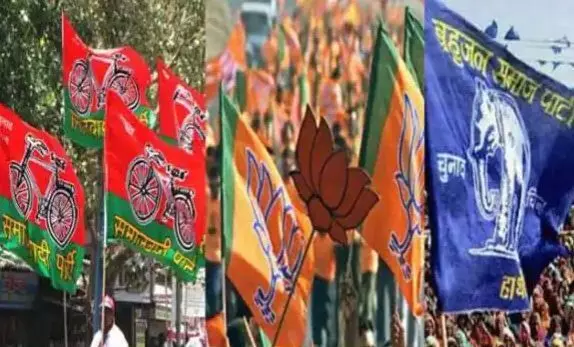TRENDING TAGS :
Are the promises made in elections are practically possible?
For the first time, the BJP has made a legal pledge, promising ten years in jail and Rs 1 lakh under the love-jihad legislation.
PC: Social Media
In Uttar Pradesh, the primary opponent BJP began a series of pledges to win voters via Sankalp Patra and SP through their SP manifesto. To celebrate Holi-Diwali, the BJP has pledged free bus travel for women over 60, scooty for female students, free electricity for irrigation to farmers, and interest from sugar mills if payment is delayed by more than 14 days. For the first time, the BJP has made a legal pledge, promising ten years in jail and Rs 1 lakh under the love-jihad legislation.
An 88-page Samajwadi promissory note promises one crore jobs in five years, two gas cylinders, 300 units of electricity, laptops for 12th pass students, 33% reservation in free education and jobs for girls, and Rs 25 lakh each for the family of those killed in the farmers' agitation, among other promises. They have promised to set MSP on all crops and compensate sugarcane farmers within 15 days, plus two sacks of DAP manure and five sacks of urea free per year. Every month, the SP will also offer one lire fuel to two-wheeler owners. Aam Aadmi and Congress made similar pledges in their manifestos. However, all five political parties have made so many promises that even if life goes on, they will not be kept. Thus, Mungerilal's unachievable promises would lead to disillusionment. So many tough promises have been dispersed that even a naive person would not trust these claims. Each party has sworn to bring the stars down by shattering them. Sadly, instead of providing tangible steps to offer employment for youngsters and provide a foundation for structural growth, the government has been claimed to open its wallet for such tasks.
They will raise the economic load on the country and states by promoting exclusively transnational firms' goods. In order to accommodate the automobiles, more imports will be required, causing a currency crisis. Remember that rising oil prices made Venezuela wealthy in 1980. But because of the wealth, the government made everything free, from food to transportation. While 70% of food was imported. Gradually, the economic situation deteriorated. During this period, oil prices fell, and Venezuela's economy collapsed.
With these negative pronouncements, the free schemes' budgets are becoming greater than the ordinary budget. Even if this is not considered a corrupt practice, it clearly undermines the fairness of elections. That's bad for democracy. No one objects to the poor being given free rations, power, water, and medication, but tempting them to vote is not only seducing the voter but also making them lethargic and para-friendly. But today the voter is aware that he does not vote on hollow promises. He understands that making electoral promises is a rite of passage for political groups. Let's see how voters will react to the political manifesto of these parties.



